Meet the winners of the 2021 OWSD-Elsevier Foundation Award
March 4, 2021
By Alison Bert, DMA
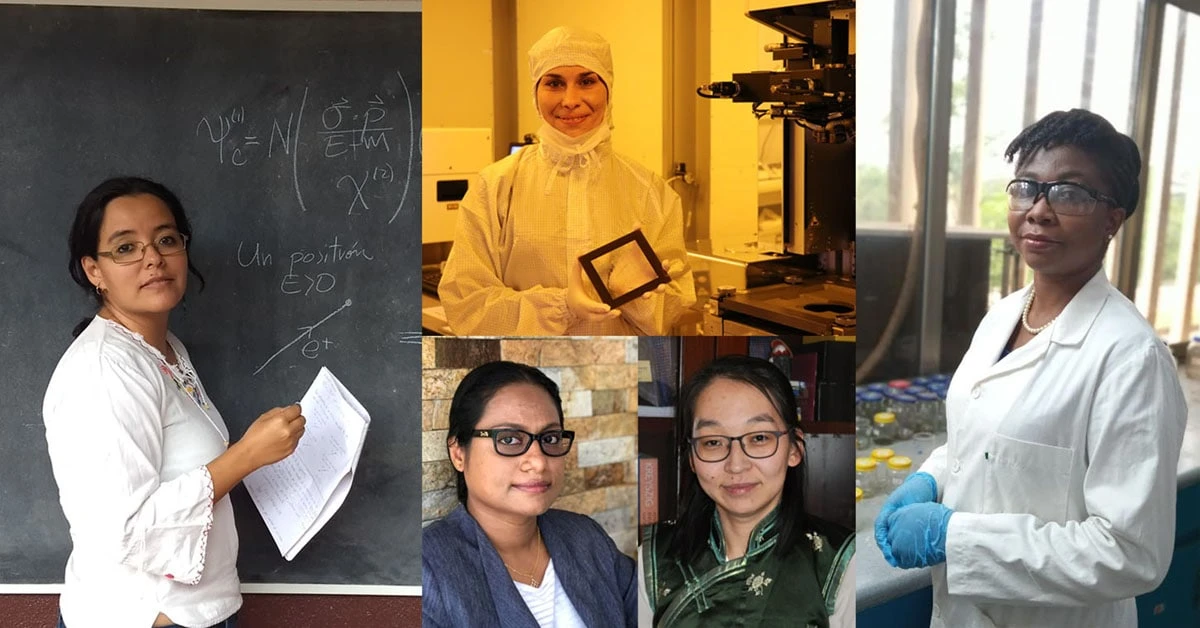
Five award-winning women scientists from the developing world will present virtually at AAAS
Caption: Winners of the 2021 OWSD-Elsevier Foundation Award for Early-Career Women Scientists in the Developing World (clockwise from left): María Eugenia Cabrera Catalán, PhD (Guatemala); Ghada Dushaq, PhD (Palestine); Marian Asantewah Nkansah, PhD (Ghana); Khongorzul Dorjgotov, PhD (Mongolia); and Imalka Munaweera, PhD (Sri Lanka)
They come from developing countries around the world, and their research is transforming the world we live in. They are the winners of the OWSD-Elsevier Foundation Award for Early Career Women Scientists in the Developing World. This year's researchers are in the physical sciences, and they represent the following regions:
Here you can read about the winners and their research — and register to watch them in the award ceremony at AAAS.
The winners
Arab Region
“My teacher said I asked too many questions”: from curious to award-winning researcher Palestinian photonics researcher honored with OWSD-Elsevier Foundation Awards for Women Scientists in the Developing World
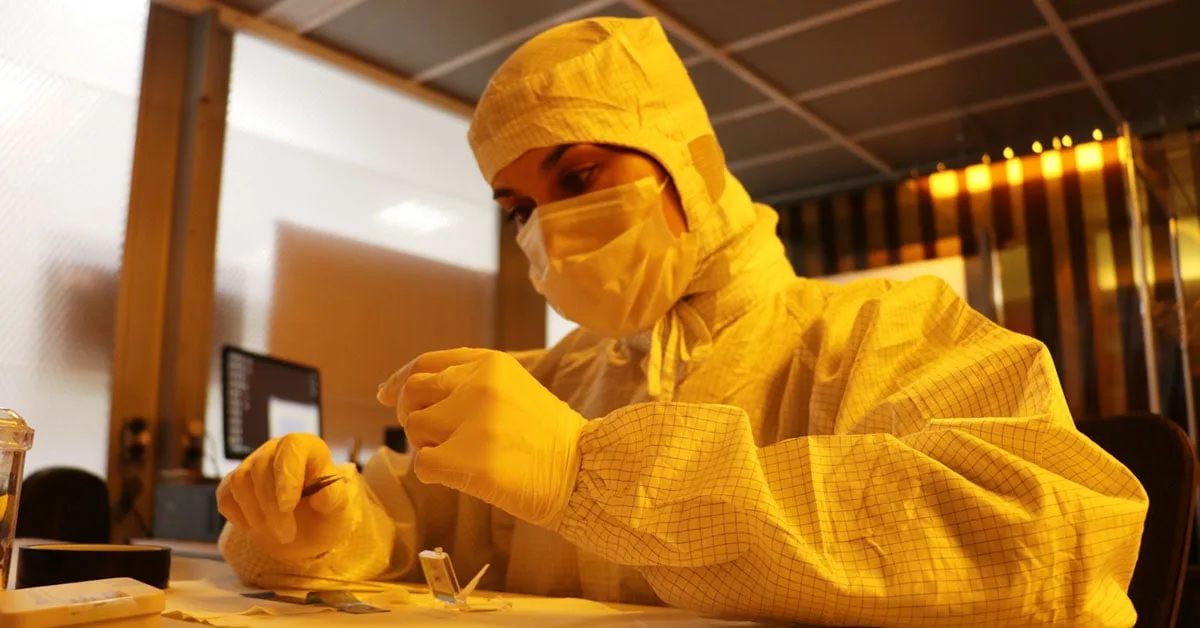
Ghada Dushaq, PhD — Physics
Postdoctoral Associate, NYU Abu Dhabi
Dr Ghada Dushaq is a Postdoctoral Associate in the Photonics Research lab of NYU Abu Dhabi. As a researcher in applied physics, she investigates new and innovative materials, structures and process technologies to improve the performance of high-speed optoelectronics, nanoelectronics and photonics devices. Her research on the use of silicon, germanium, III-V compound semiconductors, and other 2D materials is intended to improve the efficiency of current technologies and address their limitations.
Ghada received her bachelor's degree in Physics and Mathematics from Birzeit University, Palestine, with distinction in 2009. She went on to graduate with an MSc in Physics from the University of Jordan in 2012, funded by the German Academic Exchange Service (DAAD). She then pursued a PhD in Microsystems Engineering at the Masdar Institute of Science and Technology, Khalifa University, in Abu Dhabi under a cooperative program with the Massachusetts Institute of Technology, graduating in 2017.
Ghada has received several awards for her research, including the International Association of Advanced Materials (IAAM) Scientist Medal for 2018, the Post-Doctoral Conference and Travel Award from New York University Abu Dhabi in 2018, and the Falling Walls Lab prize in 2020, for her work on "Breaking the Wall of High-Speed Optical Communication," awarded at the World Science Summit in Berlin, 2020.
She has published over 35 papers in international peer-reviewed scientific journals and conference proceedings. She is also a reviewer for several scientific journals including Optics Express, Advanced Optical Materials, Scientific Reports, Applied Optics, Optical Materials Express, Journal of Applied Physics, Photovoltaic Specialist Conferences (IEEE PVSC) and the Journal of Materials Science.
Central and South Asia
Harnessing nanotechnology for cancer drug delivery and ecofriendly fertilizers Deep family loyalty led this Sri Lankan researcher to invent innovative treatments for cancer
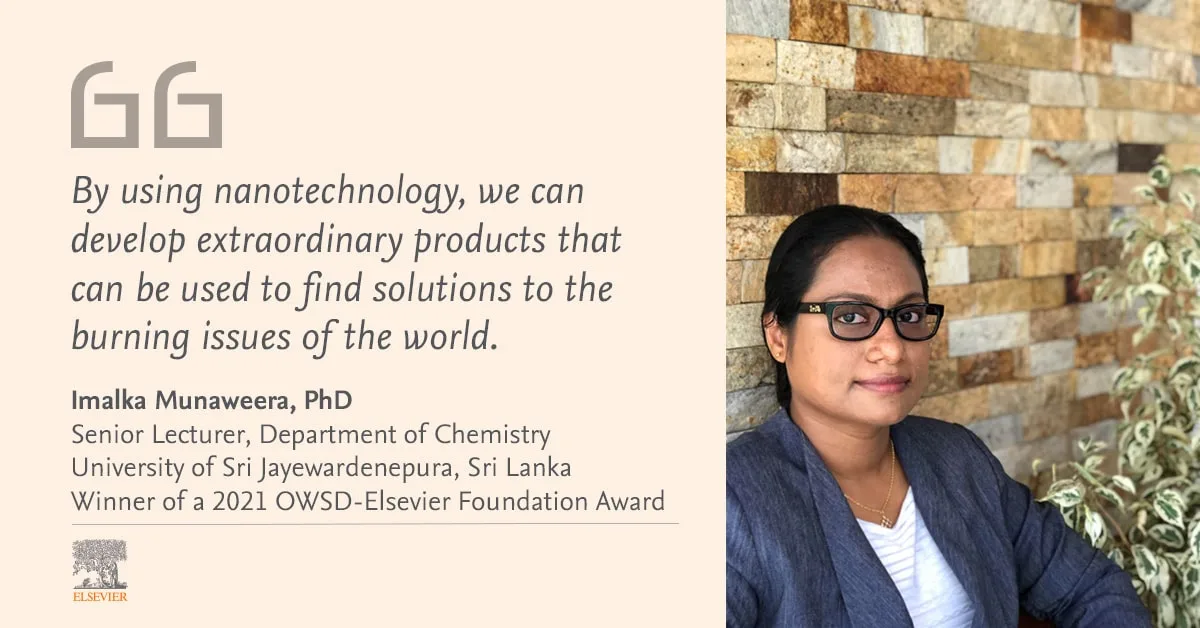
Imalka Munaweera, PhD — Synthetic Chemistry
Senior Lecturer, University of Sri Jayewardenepura, Sri Lanka
Dr Imalka Munaweera is a Senior Lecturer in the Department of Chemistry at the University of Sri Jayewardenepura in Sri Lanka. Her research focuses on using synthetic chemistry techniques to produce nanoparticles and nanofibre composites that can be applied in a range of functions, from drug delivery to water filtration to minimizing post-harvest losses of fruits and vegetables. She has made particular advances in using nanotechnology to produce environmentally-friendly and cost-effective crop fertilizers, and in developing chemoradiotherapeutic formulations and radiotherapeutic bandages for use in lung and skin cancer treatment.
Imalka first became interested in functional and applied materials as an undergraduate at the University of Peradeniya, Sri Lanka, where she worked on applications of iron oxide nanoparticles. As a master's student at the University of Moratuwa, Sri Lanka, she gravitated towards nanofertilizer research, for which she received the National Science and Technology Award in 2010 and holds two US patents. She went on to do a PhD at the University of Texas at Dallas, where she developed an innovative approach that could ultimately enable clinicians to target and aggressively reduce tumor burden in cancer patients. She also holds two US patents as well as a Sri Lankan patent and an international patent for this technology.
Following three years as a postdoctoral researcher at the University of Texas Southwestern Medical Center, Imalka worked as an Assistant Professor at Prairie View A&M University in Texas before returning to Sri Lanka, where she has worked since 2019.
Imalka received a Sri Lankan National Research Council Private-Public Partnership grant in 2019 and a research grant from TWAS, the World Academy of Sciences, in 2020. She has won several awards and has published many papers in prestigious journals including Nature Scientific Reports, Biomaterials and ACS Applied Materials and Interfaces. In addition, she has more than 10 years of experience mentoring high school, undergraduate and graduate student
East and Southeast Asia & the Pacific
Using mathematics to solve practical problems? It’s elementary. Math sleuth Khongorzul Dorjgotov honed her problem-solving skills on Sherlock Holmes
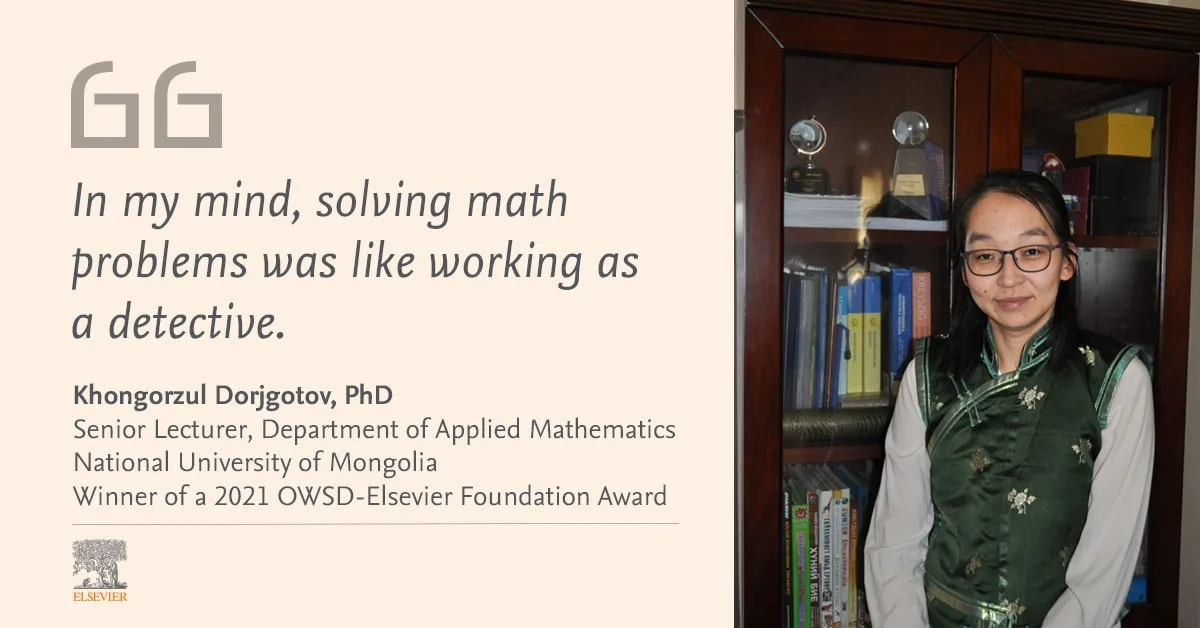
Khongorzul Dorjgotov, PhD — Mathematics
Senior Lecturer, National University of Mongolia
Dr Khongorzul Dorjgotov is a mathematician whose research focuses on fractional differential equations (FDEs), an emerging field in applied and theoretical mathematics with many applications in science and engineering. FDEs have been recognized as an excellent tool for describing complex systems and processes in many applied sciences, including physics, chemistry, biology and economics. The study of these types of equations is becoming increasingly popular as they can more accurately model a given physical system or process than conventional differential equations.
Khongorzul began studying applied mathematics as an undergraduate student at the National University of Mongolia (NUM), where she won an award for best research in a student competition. She went on to do her master's degree in the same subject, before winning a MEXT scholarship from the Japanese government for doctoral study at Kyushu University in Japan. It was there that she first started her research on FDEs, focusing on Lie theory and the symmetry approach. During the final year of her PhD, she out-competed many international students to win Best Poster at the Forum "Math-for-Industry" 2017. After completing her PhD, she returned to Mongolia, becoming one of the few women with a mathematics PhD in the country. She began working as a lecturer at NUM in 2018.
Now, Khongorzul is working to establish the study of fractional calculus in Mongolia. In addition to serving as senior lecturer and supervising graduate students, she is working to increase collaboration between the industrial and academic sectors. To this end, she recently organized, with fellow researchers, the first Mongolian "Study Group" workshops, an internationally recognized method of technology and knowledge transfer between academic mathematicians and industrial sectors. Khongorzul hopes that not only the industrial representatives but other decision-makers will be able to apply the results of mathematical research to do their jobs more effectively.
Latin America & the Caribbean
Seeking the secrets of the universe in the particle An award-winning particle physicist in Guatemala hopes to convince society that basic science matters too
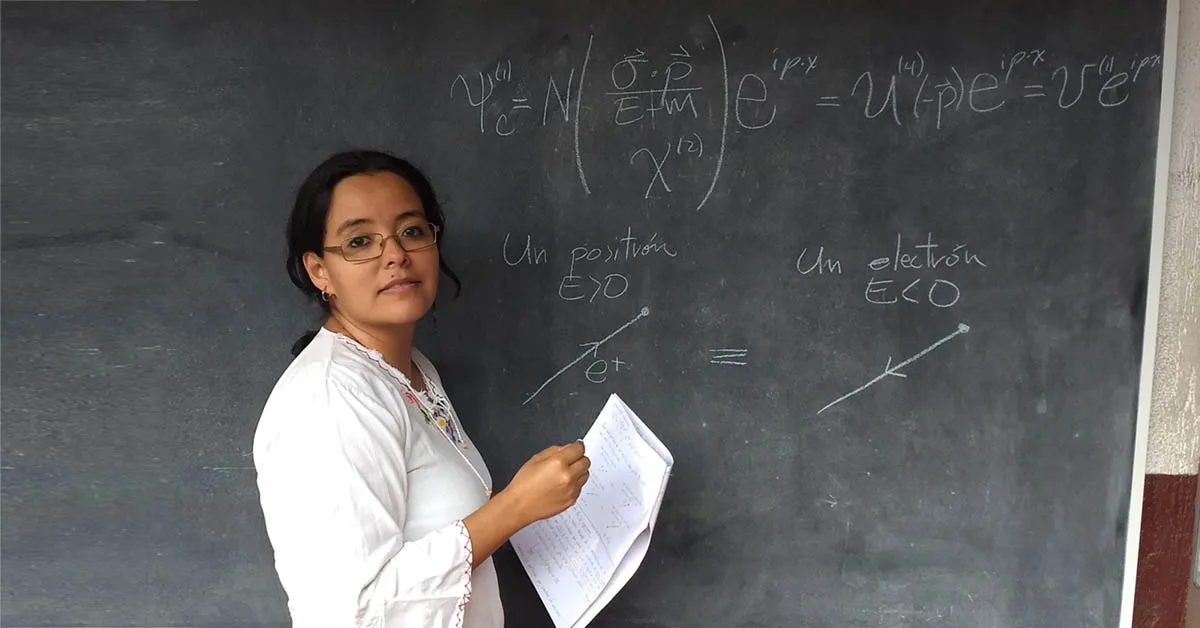
María Eugenia Cabrera Catalán, PhD — Physics
Junior Professor, University of San Carlos of Guatemala
As a Junior Professor in the School of Physical Sciences and Mathematics at University of San Carlos of Guatemala (USAC), Dr María Eugenia Cabrera’s Catalán researches the phenomenology of physics. Her work builds on the discovery of the Higgs boson particle in 2012, expanding the knowledge of what we know about the Standard Model of particle physics and the fundamental forces of nature.
María studies dark matter, the most abundant component of matter in our universe, known only by its gravitational interactions and key to developing a more fundamental theory of nature. She focuses on the interaction between newly discovered particles such as the Higgs boson; understanding these dynamics can help scientists understand the interactions that could be expected between massive weakly coupled dark matter particles in particle collider experiments, or seen by underground detectors that attempt to measure how dark matter interacts with the Earth.
María first became interested in physics in secondary school, thanks to the inspiration of her physics teacher. She majored in physics at USAC, then received a scholarship to pursue a postgraduate diploma at the Abdus Salam International Centre for Theoretical Physics (ICTP) in Italy. There, she became fascinated by high energy physics and made this the focus of her PhD research at the Institute for Theoretical Physics in Madrid. She graduated Cum Laude in 2011 with the distinction of Doctor Europeus.
Following a postdoctoral position at the GRAPPA Institute at the University of Amsterdam, during a second postdoc at the Institute of Physics at the University of Sao Paolo in 2016, María learned that her alma mater USAC was opening permanent research positions in Physics and Mathematics for the first time, with 75 percent of the time available for research. Six months later she accepted one of these positions. Now, she is working to put her country and region on the world physics map, having helped to organize the first Central American Meeting of High Energy Physics, Cosmology and High Energy Astrophysics in 2020, and dedicating much of her time to supervising and tutoring undergraduate students in particle physics.
Sub-Saharan Africa
Ghanaian chemist is finding toxic substances in unusual places Through her research and science diplomacy, an environmental chemist is changing the narrative in her native Ghana
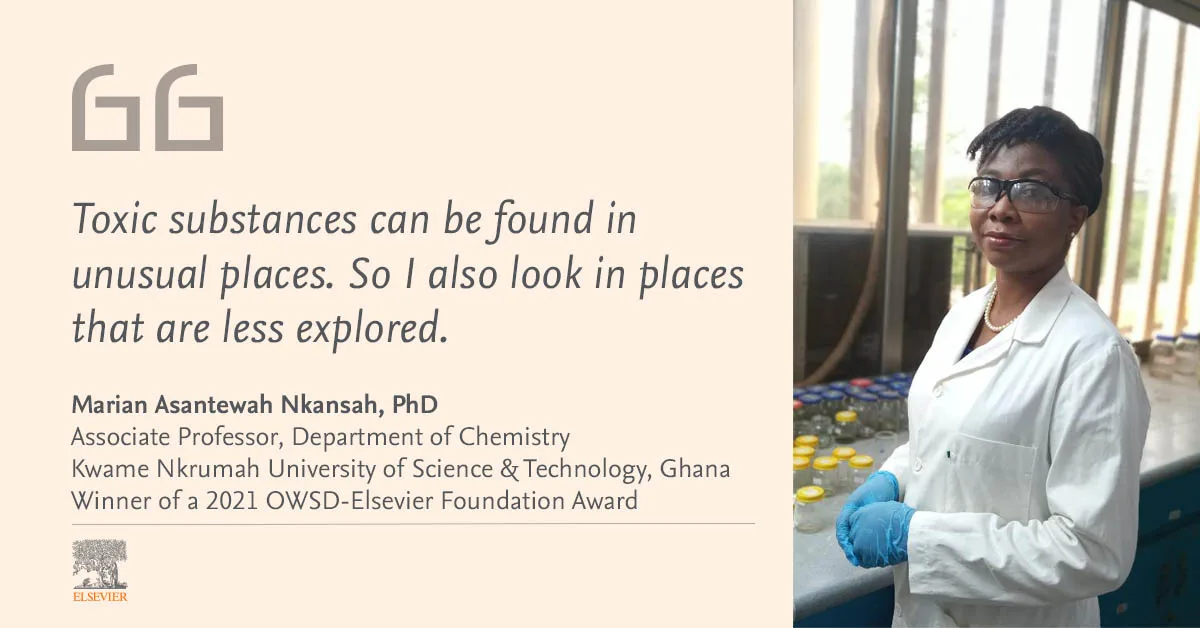
Marian Asantewah Nkansah, PhD — Environmental Chemistry
Associate Professor, Kwame Nkrumah University of Science & Technology, Ghana
Dr Marian Asantewah Nkansah is an Associate Professor in the Department of Chemistry at the Kwame Nkrumah University of Science and Technology (KNUST) in Kumasi, Ghana, where she teaches Practical Chemistry, Nuclear/Radiochemistry, Chemistry and Society, and Petroleum Chemistry. In her research, she focuses on identifying and characterizing the presence of both inorganic and organic contaminants in water, food, soil, the atmosphere and other environmental matrices, and on developing strategies for environmental remediation. By preparing and analyzing samples from different environments, she can determine the levels and effects of contaminants such as heavy metals, persistent organic pollutants (POPs) and polycyclic aromatic hydrocarbons (PAHs), which are generated by urbanization, industrial activities, artisanal activities and mining. She is striving to make the public aware of the risks of heavy metals, which she has found in unexpected places such as spices, lipstick, edible clay and classroom dust
Growing up as one of six children in Ghana during a period when the economy was in a state of collapse, Marian had a desire to help society from an early age. After completing her bachelor's and master's degrees in Chemistry at KNUST, she went to Norway to pursue her PhD in Environmental Chemistry at the University of Bergen. After completing it in 2012, she returned to KNUST where she worked as Lecturer and then Senior Lecturer before being promoted to Associate Professor in 2019, making her the youngest woman at the university to hold this position.
In addition to her research and teaching, Marian has undertaken training in science diplomacy. She is involved in advocacy and initiatives of the Ghana Academy of Arts and Sciences, and she mentors school children and younger peers. Her many achievements have brought her international recognition, including the TWAS FM Al-Kharafi Prize in 2016, a feature in the book Women in Science: An Inspiring Story from Africa and a slot on the commemorative Periodic Table of Younger Chemists by the International Union of Pure and Applied Chemistry (IUPAC).
Marian has 33 peer-reviewed articles and books chapters.
Watch the AAAS ceremony
The virtual ceremony was on February 9. Here's how to watch the recording:
Selected research by the awardees
These are selections of the award winners' research papers published in Elsevier's journals.
Khongorzul Dorjgotov, PhD
Lie symmetry analysis of a class of time fractional nonlinear evolution systems, Applied Mathematics and Computation (Jul 2018)
Ghada Dushaq, PhD
An optimization technique for performance improvement of gap-changeable MEMS accelerometers, Mechatronics (Oct 2018)
Low temperature deposition of germanium on silicon using Radio Frequency Plasma Enhanced Chemical Vapor Deposition, Thin Solid Films (Aug 2017)
Tuning the optical properties of RF-PECVD grown μc-Si:H thin films using different hydrogen flow rate, Superlattices and Microstructures (Jul 2017)
Distribution and coverage of 40nm gold nano-particles on aluminum and hafnium oxide using electrophoretic method and fabricated MOS structures, Materials Research Bulletin (Nov 2016)
Imalka Munaweera, PhD
Urea–hydroxyapatite-montmorillonite nanohybrid composites as slow release nitrogen compositions, Applied Clay Science (Dec 2017)
Radiotherapeutic bandage for the treatment of squamous cell carcinoma of the skin, Nuclear Medicine and Biology (Jun 2016)
Nitric oxide- and cisplatin-releasing silica nanoparticles for use against non-small cell lung cancer, Journal of Inorganic Biochemistry (Dec 2015)
Marian Asantewah Nkansah, PhD
, Toxicology Reports (2016)
The use of lightweight expanded clay aggregate (LECA) as sorbent for PAHs removal from water, Journal of Hazardous Materials (2012)
About the award
Since 2012, the OWSD-Elsevier Foundation Awards for Early-Career Women Scientists in the Developing World have recognized the achievements of researchers who have made significant contributions to the advancement of scientific knowledge. The program represents a longstanding partnership between the Organization for Women in Science for the Developing World (OWSD) (OWSD) and the Elsevier Foundation.
Each year, five winners are selected from the following regions: Latin America and the Caribbean; East and Southeast Asia and the Pacific; Central and South Asia; the Arab region; Sub-Saharan Africa. Prizes are awarded annually on a rotating basis among the disciplines of Biological Sciences, Engineering Sciences and Physical Sciences.
Each winner is sponsored to attend the annual meeting of the American Association for the Advancement of Science (AAAS), where they present their research at a special networking ceremony. There, they have the opportunity to attend workshops, meet experts in their field and visit local laboratories and institutions, establishing contacts and collaboration networks with colleagues from around the world.
With the 2021 winners, the program has awarded 45 scientists from 20 countries.
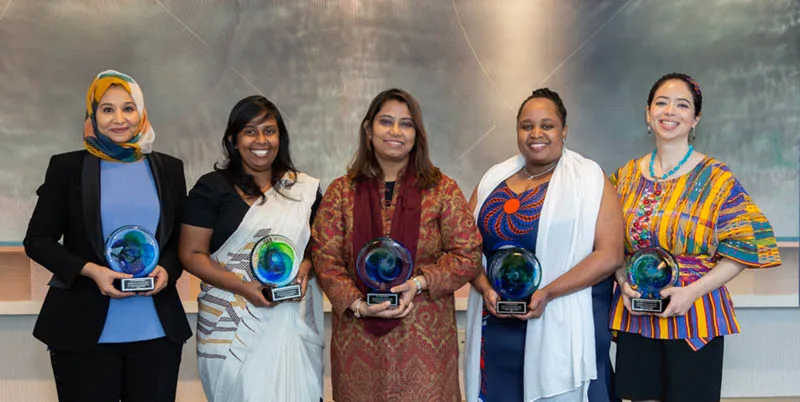
The 2020 OWSD-Elsevier Foundation Award winners at the AAAS Meeting in Seattle (Photo by Alison Bert)
In the media
We will continue to post articles about the awardees as they are published.
The award
Globally diverse winners of the 2021 OWSD-Elsevier Foundation Awards announced, Great British Politics
María Eugenia Cabrera Catalán, PhD
Científica guatemalteca recibe el premio OWSD-Elsevier Foundation Award, El País de los Jóvenes)
Khongorzul Dorjgotov, PhD
D.Khongorzul becomes winner of award for Early-Career Women Scientists in the Developing World, Montsame Mongolian News Agency (Feb 9, 2021)
Ghada Dushaq, PhD
Dr. Ghada Dushaq, groundbreaking physics researcher, paves the way for women in science, Birzeit University (Feb 12, 2021)
Imalka Munaweera, PhD
Dr. Imalka Munaweera awarded for research in nanotechnology, nation.lk (Feb 2021)
Marian Asentewah Nkansah, PhD
A natural response to my curious mind and quest to know, Research Information (Feb 19, 2021)
2021 OWSD-Elsevier Foundation Award — Prof Marian Asantewah Nkansah, Ghana Young Academy (Feb 8, 2021)
Information for this page was provided by OWSD and the Elsevier Foundation.
Contributor
